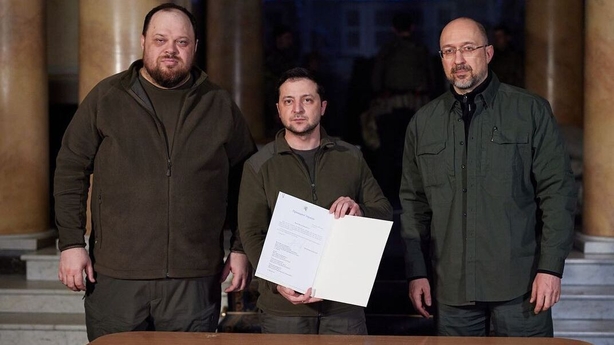The presidents of eight central and eastern European nations have called on European Union member states to immediately grant Ukraine a EU candidate country status and open membership talks according to an open letter.
"We, the Presidents of the EU member states: the Republic of Bulgaria, the Czech Republic, the Republic of Estonia, the Republic of Latvia, the Republic of Lithuania, the Republic of Poland, the Slovak Republic, and the Republic of Slovenia strongly believe that Ukraine deserves receiving an immediate EU accession perspective," the letter said.
But the European Union earlier poured cold water on a plea from Ukrainian President Volodymyr Zelensky for "immediate" membership to the bloc despite strong support from eastern EU states.
EU officials stressed that the adherence procedure takes years, dampening Ukraine's hopes that suddenly becoming part of the European club could help it better weather the Russian invasion and speed up military, financial and political support.
Several officials walked back a comment by European Commission chief Ursula von der Leyen that appeared to hold out the prospect of Ukraine being admitted.
"They are one of us and we want them in," she told Euronews in an interview yesterday, after emphasising existing EU-Ukraine cooperation.
Mr Zelensky seized upon that to appeal to the European Union "for the immediate accession of Ukraine via a new special procedure".
"Our goal is to be together with all Europeans and, most importantly, to be on an equal footing. I'm sure it's fair. I'm sure it's possible."

Ukraine's bid has received strong support from member states in eastern Europe.
"Today, when the Ukrainians heroically defend themselves against Russian aggression it's high time to welcome Ukraine into the EU community," Polish Foreign Minister Zbigniew Rau tweeted.
"Poland will provide all necessary assistance to Ukraine's accession process," he said.
The presidents of eight eastern European countries urged EU members to "enable EU institutions to take steps towards an immediate granting of the status of an EU candidate country to Ukraine, and to start the process of accession talks".
Aspirants wanting to join the bloc typically face a long and complex process that often requires major reforms to reach EU standards.
They also have to prove that their finances are heading in a direction that will allow them to adopt the euro.
EU foreign policy chief Josep Borrell said that any bid for membership could take "a lot of years".
Ms von der Leyen's spokesman, Eric Mamer, walked back her comments, telling journalists that the EU chief meant that Ukraine "is a European country and we want them in, meaning Europe in general".
The European Commission said that, in any case, it can only negotiate with hopeful candidate countries on the basis of a mandate from the EU's 27 member states - something it has not received for Ukraine.
"At the end of the day, this is a debate at the highest political level, for the (European) Council," where the member states take decisions, said a commission spokeswoman, Ana Pisonero.
The president of the European Council, Charles Michel, told a group of journalists that there were already longstanding disagreements among EU countries on enlarging the bloc.
"There are different opinions and sensitivities within the EU on enlargement," he told a group of journalists.
He said Kyiv would have to submit an official request to join before member states - which would have to greenlight membership unanimously - could come up with a position.
According to Mr Zelensky's Telegram channel, the Ukrainian president signed such a request on Monday.
The European Union, created by six nations under a different name in 1957, has expanded in four waves over the past three decades.
After Britain's exit from the bloc in 2020, it counts 27 member states.
There are currently five countries that are candidates to join - Turkey, Serbia, North Macedonia, Montenegro and Albania - but their bids have been stuck in limbo for years.
The last country to join the EU was Croatia, which was admitted in 2013 - after nearly a decade of negotiations and reforms.

